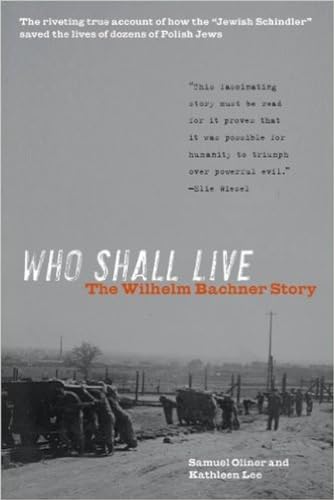
Who Shall Live
by Samuel Oliner
"The Wilhelm Bachner Story"
Popularity
3.51 / 5
* A book's popularity is determined by how it compares to all other books on this website.
Where to buy?
Buy from Amazon* If you buy this book through the link above, we may receive a small commission at no extra cost to you.
Who Shall Live by Samuel Oliner
Details
War:
World War II
Perspective:
Civilian
True Story:
Yes
Biography:
Yes
Region:
Europe
Published Date:
2010
ISBN13:
9780897336017
Description
Brief Summary
Who Shall Live by Samuel Oliner offers an in-depth exploration into the incredible heroics of Wilhelm Bachner, a man known as "the Jewish Schindler" for his efforts in saving hundreds of Jewish families from the Warsaw Ghetto during the Holocaust in 1939. The book is based on interviews conducted with Bachner in 1983, combined with extensive historical research, shedding light on yet another remarkable narrative of resistance during one of history’s darkest periods.
Main Themes and Topics
The book primarily revolves around themes of courage, human resilience, and moral integrity in the face of overwhelming adversity. It explores the profound impact one individual can have when standing against tyranny and injustice. Bachner's story is a testament to the human spirit's indefatigability and the power of altruism during times of extreme suffering. Additionally, the book delves into the broader context of Jewish resistance during the Holocaust, providing a stirring account of defiance and survival.
Writing Style and Tone
Samuel Oliner employs a factual yet empathetic tone that conveys the gravity of the events while honoring the courageous acts of Wilhelm Bachner and those around him. The narrative combines rigorous historical research with personal interviews, creating a vivid tapestry that transports readers to the heart of the Warsaw Ghetto. Oliner’s clear and precise prose makes complex historical facts accessible, ensuring the story's emotional impact resonates deeply with the reader.
Awards and Recognition
Who Shall Live has been recognized for its contribution to historical literature and its poignant recounting of Jewish resistance during the Holocaust. It has been lauded by scholars and praised for shedding light on lesser-known stories of heroism during this period, positioning it as a significant work in Holocaust studies.
Criticism
While the book has been widely praised for its meticulous research and moving narrative, some critiques point to the potential for bias given its reliance on a single primary source for personal anecdotes—Bachner himself. Though the research supports the narrative, critics suggest a more diversified range of perspectives could have enriched the authenticity of the account. Despite this criticism, the book remains a highly regarded piece of historical documentation.









